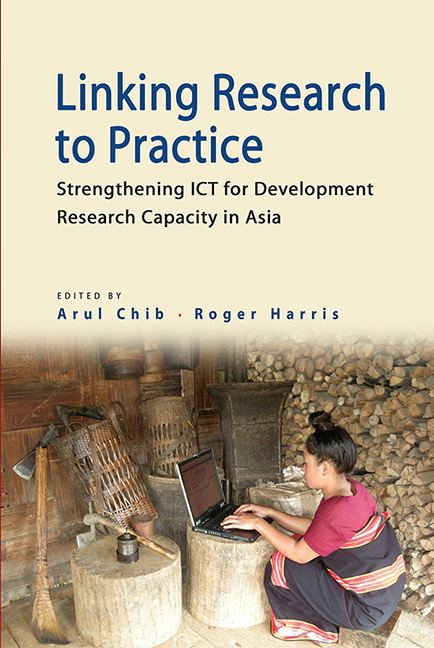Book contents
- Frontmatter
- Contents
- List of Tables
- List of Figures
- Foreword
- Preface
- Acknowledgement
- SECTION I MANAGEMENT PERSPECTIVES: INSIDERS' THOUGHTS ON THE PROGRAMME
- SECTION II RESEARCH PERSPECTIVES: THEORETICAL REFLECTIONS BY EXPERTS
- SECTION III RESEARCH OUTPUTS
- 11 It's the Talk, Not the Tech: What Governments Should Know about Blogging and Social Media
- 12 Integrating Digital and Human Data Sources for Environmental Planning and Climate Change Adaptation: From Research to Practice in Central Vietnam
- 13 The Challenge of Working Across Contexts and Domains: Mobile Health Education in Rural Cambodia
- 14 The Dynamics and Challenges of Academic Internet Use Amongst Cambodian University Students;
- SECTION IV SYNTHESIS AND CONCLUSION
- About the Contributors0
- Index
14 - The Dynamics and Challenges of Academic Internet Use Amongst Cambodian University Students;
from SECTION III - RESEARCH OUTPUTS
Published online by Cambridge University Press: 21 October 2015
- Frontmatter
- Contents
- List of Tables
- List of Figures
- Foreword
- Preface
- Acknowledgement
- SECTION I MANAGEMENT PERSPECTIVES: INSIDERS' THOUGHTS ON THE PROGRAMME
- SECTION II RESEARCH PERSPECTIVES: THEORETICAL REFLECTIONS BY EXPERTS
- SECTION III RESEARCH OUTPUTS
- 11 It's the Talk, Not the Tech: What Governments Should Know about Blogging and Social Media
- 12 Integrating Digital and Human Data Sources for Environmental Planning and Climate Change Adaptation: From Research to Practice in Central Vietnam
- 13 The Challenge of Working Across Contexts and Domains: Mobile Health Education in Rural Cambodia
- 14 The Dynamics and Challenges of Academic Internet Use Amongst Cambodian University Students;
- SECTION IV SYNTHESIS AND CONCLUSION
- About the Contributors0
- Index
Summary
ABSTRACT
Within the Cambodian educational sector, ICT discourse has brought about new challenges and opportunities. The policy response from the government has been aimed at increasing access to education through ICTs, promoting a life-long learning approach to education, and empowering the Cambodian workforce with technical skills required to compete in a knowledge-based economy, whilst higher educational institutions have promoted the access to the Internet for their students. However, empirical knowledge of their use and understanding of the Internet has been largely absent. This chapter reports the findings from a research project intended to examine the extent to which students at selected Cambodian universities utilise the Internet for general and academic purposes by analysing the dynamics that shape Internet use. At the end, we employ Strengths, Weaknesses, Opportunities, and Threats (SWOT) analysis to evaluate the current conditions of academic Internet use in Cambodian higher education.
BACKGROUND
The role of Information and Communication Technologies (ICTs) in the upheaval of Cambodia's troubled education sector after the country's emergence from years of political instability has been a topic of much intrigue. Although the quality of and access to education has suffered from a lack of trained teachers and inadequate teaching materials (Abdon, Ninomiya and Rabb 2007; UNESCO 2004), by 2010, the net enrolment rate for primary education reached 95% and that for upper secondary level, 16% (MoEYS 2011; ODI 2010). Additionally, the enrolment rate for tertiary education reached 10% in 2009 (World Bank 2011). These developments were made possible because of the political solution in the early 1990s, particularly the 1991 Paris Peace Agreement and the national reconstruction afterward, which lifted Cambodia out of two decades of isolation and opened up foreign developmental interventions. The ICT for development (ICT4D) discourse in Cambodia is linked to these political changes and developmental interventions, noticeably through the initiatives supported by such international organisations as UNESCO, UNICEF, the Asian Development Bank, and the World Bank (Richardson 2008).
- Type
- Chapter
- Information
- Linking Research to PracticeStrengthening ICT for Development Research Capacity in Asia, pp. 157 - 172Publisher: ISEAS–Yusof Ishak InstitutePrint publication year: 2012

